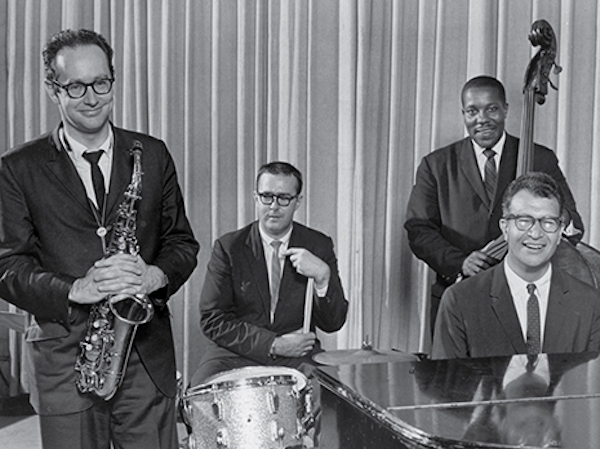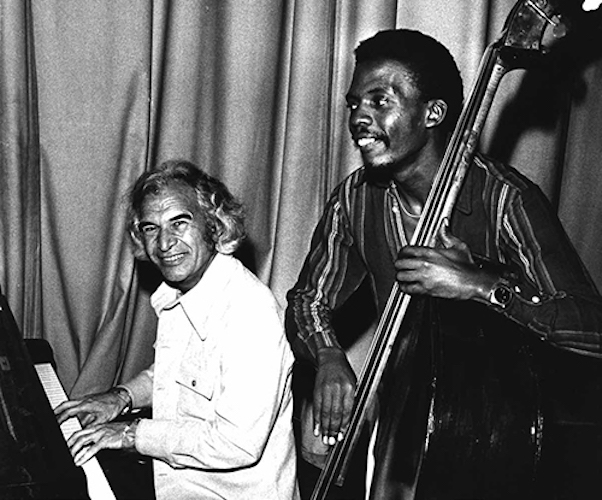Book Review: “Dave Brubeck and the Performance of Whiteness” — No Way Out?
By Steve Provizer
Dave Brubeck and the Performance of Whiteness has scholarly value but, given its diminution of human agency, it will not significantly impact real life public conversations about ending white privilege and dealing with the complexities of cultural appropriation.
Dave Brubeck and the Performance of Whiteness by Kelsey Klotz. Oxford University Press, 320 pages, $29.95.
 While not a significant element in public conversations around race, White Performance Theory is an area much explored in academia. As delineated here by author Kelsey Klotz, white performance is the theory/idea that white people have not understood their own racial frames; they simply believe that whiteness is the norm and everything else a deviation. This framework has been built up through shared experiences, socialization, and language performances, beginning with the dominance exerted by white empires. It is maintained, Klotz says, through the process of ”exnomination,” in which whiteness avoids being named and thus keeps itself out of the field of interrogation.
While not a significant element in public conversations around race, White Performance Theory is an area much explored in academia. As delineated here by author Kelsey Klotz, white performance is the theory/idea that white people have not understood their own racial frames; they simply believe that whiteness is the norm and everything else a deviation. This framework has been built up through shared experiences, socialization, and language performances, beginning with the dominance exerted by white empires. It is maintained, Klotz says, through the process of ”exnomination,” in which whiteness avoids being named and thus keeps itself out of the field of interrogation.
Klotz has chosen the musician Dave Brubeck as the subject of her study — the means by which she can explore the power of white performance and address larger questions of economic imperialism and racial hegemony, particularly the linkage of race and capitalism in mid-century America. In Brubeck, she has found her every (white) man. Brubeck sold millions of records. I’m but a musician-manque turned ink-stained wretch. However, as a white man, I’m willing to accept Brubeck as a reasonable surrogate, and to be subject to the same analysis she gives to him. However, I don’t accept the idea that I am a cypher, which is what Klotz does. She insists that the actions of any particular individual have little or no influence on the bigger exploitative picture. So, despite the force of Klotz’s argument, I find myself saying: “Yes, but…”
The book delineates an expansive system of capitalism-cum-racism and white domination in which there is no way to avoid collusion. The author has marshaled considerable evidence to support her idea of white performance, but she doesn’t seem to have wrestled with a couple of crucial questions: Is the goal just to propound a convincing theory? Is it possible to write in a way that offers alternatives that might alter people’s behavior?
As described by Klotz, Brubeck took advantage of situations as they arose, trying to improve his fortunes and his agenda of personal creativity — the kind of behavior any musician pursuing a career would follow. At the same time, Brubeck seemed to treat family, friends, and fellow musicians well, performing early on in integrated groups, forming his own interracial band and, eventually, demanding his audiences not be segregated. Klotz demonstrates that the lionization of Brubeck was largely a creation of white-dominated media and music businesses, but his actions concerning racial equality were, nonetheless, commendable. Klotz sees all these actions as racially determined strategies and deems them, well, meh…
Does the white musician have an economic advantage? Of course. But does this explain every or any particular individual’s behavior? Does race explain why Charlie Parker used hard drugs and Ornette Coleman didn’t? Does race explain the dramatically different life choices made by Doc Cheatham and Jelly Roll Morton, or Benny Goodman and Red Rodney?
Surely, while driving home a thesis, an author might provide some sort of counterargument, in this case one that is less supportive of the omnipresent capitalist-racist agenda. If so, I can only speculate on what that is. Are there lessons for current musicians based on Brubeck’s career? Should musicians detach themselves from the white-dominated business of booking and selling music, as Brubeck did not? Start an independent label? Tell Time magazine not to put them on the cover? Black or white, these are decisions that involve a lot more than race. Dave Brubeck and the Performance of Whiteness doesn’t contemplate these questions, and that is consistent with Klotz’s notion that white supremacy is so embedded in the practices shared in a community that individual intention has little to do with it. She says we’re acculturated to see ourselves as single actors, but we’re not. It is beside the point, the author says, whether we call Brubeck a “good person” or not, because racism is not about individuals, it is about “structures of white supremacy.”
In an actual, real-time conversation, listening to others and entertaining alternative points of view are the prerequisites for personal change. A deluge of facts can easily come across as bullying and lead to deeper entrenchment. Intellectual victories are pyrrhic. Put people in boxes and all they will see are the walls. Leadership is imperative, of course, but institutions change when individuals change.
It’s no small task to effectively invite individuals to acknowledge and challenge all the assumptions by which they have lived. Performing Whiteness addresses Klotz’s issues more directly and productively. The article’s author, Sarah Bellamy, limns the performance of whiteness using a more realistic assessment of human-scale causes and possible steps that might be taken. Rather than seeing racism/capitalism as the DNA of cultural institutions, the author acknowledges the causes and difficulties of personal change and the perilous voyage of self-discovery that entails. The case is argued in a way that might actually make readers reevaluate their relationship to white supremacy. Bellamy doesn’t cite this story, but I will: Before he met Nelson Mandela, South African Boer General Constand Viljoen had vowed to fight to the death. After meeting with, and recognizing the humanity, of Viljoen, Mandela convinced him to order his followers to lay down their arms. A most formidable enemy was transformed into a participant in the democratic process.

From left to right: Paul Desmond, Joe Morello, Eugene Wright, and Dave Brubeck, 1961. This ensemble is widely considered to be the “classic” iteration of the Dave Brubeck Quartet. Photo: Wiki Commons.
Klotz’s analysis of the Time magazine covers of Brubeck, Armstrong, Ellington, and Monk are convincing, as are her insights regarding racism in booking and other aspects of the music business. However, to avoid putting limits on the degree that racial determinism drives the entire system, she emphasizes some facts while strategically downplaying others. For example, one reads in her footnotes counterarguments to what appears in text. She denigrates Brubeck’s espousal of a “color-blind” philosophy. However, in a footnote she acknowledges that Harvard Professor Ingrid Monson — whom she often cites — says that Black musicians also “deployed colorblind discourse” (Miles hiring Konitz, etc.). Kloss does a thorough analysis of Brubeck’s strategy of fostering respectability and bringing in a new (white) audience for jazz by playing “white” venues. However, in footnotes, she also acknowledges that “respectability politics” has been a strategy for Black musicians as well. Both Black and white musicians (“of course”) sought access to concert halls, in pursuit of money and respectability.
One can only evaluate historic events in the light of current thinking, but how unyielding to context should one be when judging past actions? For example, denigrating efforts made by white bandleaders to integrate their groups in the ’30s is glib, a cheap shot. Klotz reasons that their careers were the ultimate beneficiaries of their actions and that they had nothing to lose. I disagree that they had nothing to lose. But I chafe more at the idea that Klotz is implicitly saying that the music wasn’t enough of a force to effect common cause among disparate racial groups; that musicians seeking common ground in cultural cracks in order to jam and record together was merely performative. Must we relegate to a gesture of little importance Louis Armstrong’s characterization of Jack Teagarden as his real brother or to the many other documented instances of interracial comity in the jazz community?

Performing in South Africa Dave Brubeck performing with Victor Ntoni in Johannesburg, South Africa, 1976. Photo: Wiki Common.
I agree with the author that it’s an important goal to: ”…disavow and dismantle the power, privilege and effect of whiteness.” I also agree that oppression is endemic. However, I believe this oppression of “the other” applies not only to race, but (at least) to class, religion, and appearance. I don’t think there is a single cause for any kind of oppression, nor a single formula for eliminating it. The theory of white performance has power, but it needs to be contextualized with other behavioral and cultural factors. It must come to grips with the fact it renders altruism an empty promise. Accepting this all-or-nothing perspective means that individual actions — attempts to “do the right thing” — have little meaning. Klotz says that whether or not Brubeck is a good or bad person is beside the point. I disagree.
Dave Brubeck and the Performance of Whiteness has scholarly value but, given its diminution of human agency, it will not significantly impact real life public conversations about ending white privilege and dealing with the complexities of cultural appropriation. History has shown that there are sweet spots where altruism and self-interest meet. But the Theory of White Performance, at least as delineated here, is about convincing us that they never really happened.
Steve Provizer writes on a range of subjects, most often the arts. He is a musician and blogs about jazz here.
Tagged: Dave Brubeck, Dave Brubeck and the Performance of Whiteness

Good review. Cuts through the fog that envelops this theory, or at least this author’s presentation of it, and counters with a theory of his own that seems more solid. But I am left with one question. Who the hell is Kelsey Klotz anyway?
>> Does race explain why Charlie Parker used hard drugs and Ornette Coleman didn’t? Does race explain the dramatically different life choices made by Doc Cheatham and Jelly Roll Morton, or Benny Goodman and Red Rodney?<<
Excellent point. This is a fine review and a much-needed balance to the book’s perspective. All-or-nothing thinking, with any nod to complex gray areas inbetween being seen as an admission of some kind of weakness in the theory, is exactly what is wrong with so much academic thinking these days.
“Does race explain why Charlie Parker used hard drugs and Ornette Coleman didn’t?” Maybe not but certainly the hardships of racism are a factor in why many Black musicians used heroin. No? One thing not mentioned in the review above but such an obvious point: there are zillions of better jazz pianists than Dave Brubeck, many of them Black, who never attracted the audiences or, I imagine, financial success of the Dave Brubeck Quartet. Was that discussed in the book? On the other hand, alto sax player Paul Desmond surely has a “white sound” but he was also an extraordinary musician and deserves to be lauded. Very complex.
Of course, race is a factor in drug use, but not the only one. As far as Brubeck’s musicianship, a basic underpinning in the book is the racial factor in his success. Of course, musicians of all races have lined up to criticize Brubeck’s playing. Point is, nothing is as determinative as this theory makes it out to be.
One of the things I liked about Louis Armstrong’s remembrance of growing up in New Orleans is his description of “our white people.”
Don’t know if this will help but…
from You Can’t Steal a Gift: Dizzy, Clark, Milt, and Nat by Gene Lees (Lincoln, NE: Univ of NE Press, 2001 ISBN 0-8032-8034-3)
(page 96) Phil Woods: “I was in Birdland, stoned, as I often was in those days. Dizzy and Art Blakey kidnapped me. Took me home to Dizzy’s and sat me down and said, ‘What are you moaning about? Why don’t you get your own band?’
“I tearfully asked them if they thought I was good enough, and one of them said, ‘Yeah! If you stop behaving like an asshole!’
“I asked them if a white guy could make it, considering the music was a black invention. I was getting a lot of flak about stealing not only Bird’s music but his wife and family as well [Woods was married to Chan, Charlie Parker’s widow], especially from Mingus. Miles was always nice to me, very supportive, as was and remains Max Roach. And Dizzy said, ‘You can’t steal a gift. Bird gave the world his music, and if you can hear it you can have it.'”
(106) Sonny Rollins: “Jazz has always been a music of integration. In other words, there were definitely lines where blacks would be and where whites would begin to mix a little. I mean, jazz was not just a music; it was a social force in this country, and it was talking about freedom and people enjoying things for what they are and not having to worry about whether they were supposed to white, black, and all this stuff. Jazz has always been the music that had this kind of spirit. Now I believe for that reason, the people that could push jazz have _not_ pushed jazz because that’s what jazz means. A lot of times, jazz means no barriers. Long before sports broke down its racial walls, jazz was bringing people together on both sides of the bandstand. Fifty-second Street, for all its shortcomings, was a place in which black and white musicians could interact in a way that led to natural bonds of friendship. The audience, or at least part of it, took a cue from this, leading to an unpretentious flow of social intercourse.”
Dave Brubeck on slavery’s scar:
https://www.milkenarchive.org/videos/category/oral-histories/dave-brubeck-seeing-slaverys-scar/